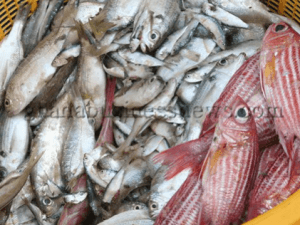EU partners with Ghana to improve fisheries sector
 A European Union funded project dubbed, “Ensure Greater Environmental Sustainability and Social Equity in Ghana’s Fishery Sector, has been launched to help promote food security and improved livelihoods in the sector.
A European Union funded project dubbed, “Ensure Greater Environmental Sustainability and Social Equity in Ghana’s Fishery Sector, has been launched to help promote food security and improved livelihoods in the sector.
The project would also help in reducing illegal fishing activities and promote participatory co-management of fisheries.
The Environmental Justice Foundation (EJF), a UK based non-profit organization working to protect the environment and defend human rights is partnering Hen Mpoano, a non-profit organization based in Ghana to implement the three-year project.
Ghana’s fisheries sector is a significant contributor to the economy and is the main source of income for millions of people.
About 70 per cent of Ghana’s fish catch comes from the small-scale artisanal sector, but overfishing, illegal fishing and poor management are threatening the long-term sustainability- hitting these small-scale fisheries the hardest.
The project seeks to empower small-scale fishers to secure their tenure rights, implement a co-management approach to fisheries, combat illegal fishing and promote alternative livelihoods as a means to reduce dependence on the fishing sector.
Mr Kofi Agbogah, Director of Hen Mpoano, said the project would be implemented in 10 districts within the Central Region and the Volta Estuary where, fisher folks would be engaged in ways of improving good fishing practices while supporting efforts towards the eradication of poverty and hunger within these communities.
“It is important that we empower these communities and ensure that their voice is heard as artisanal fishers have a vital role to play if we want to retain the sustainability in the fishing sector. We need to secure these communities’ tenure rights, and ring fence their traditional fishing activities against external aggression such as urbanization or other economic activities”
Mr Agbogah said the Fisheries Commission would as usual give the necessary support as stakeholders get ready to prepare the action plan that would guide the implementation process.
Mr Antoine Rougier, Country Coordinator of EJF, commended Ghana for its efforts in tackling the unsustainable and illegal fishing practices that has far too long plagued the sector.
He said statistics shows that West Africa has the highest rate of illegal fishing practices in the world and that Ghana was also losing so much money to illegal, unregulated and unreported (IUU) fishing and this contravenes international law on fishing.
Mr William Hanna, EU Ambassador, said a total of 1.9 million Euros is being given as a grant to support the project.
He said a few years ago, ERU was worried about how fishing was being done in Ghana and so it issued a warning for the country to regulate its fishing activities before it could export fish to some European countries.
“The good news is that Ghana has worked so hard and today the EU is here to help ensure the sustainability of the fishing sector”, Mr Hanna said.
Mrs Elizabeth Afoley Quaye, the Minister of Fisheries and Aquaculture, in a speech read on behalf, commended all the stakeholders in the effort that would ensure improved management of the fishing sector.
She said co-management in fisheries would enable responsibility of the resource to be shared between user groups and the government, and opportunities would be created for both the community and government to be involved in decision-making, implementation and enforcement processes.
She said government was working with other partners to engage fisher communities to participate in the co-management of the fisheries resources.
“Under this, volunteers in pilot communities-cluster within the Greater Accra Region are being trained and equipped to undertake education and sensitization of their community members on the fisheries laws, report and assist in the prosecution of fisheries infractions, conduct lake and land patrols and also to undertake registration of canoes.
“Other co-management arrangements to institute rights-based approaches in fisheries resource management are being piloted under the West Africa Regional Fisheries programme in some communities in the marine and inland areas”.
Mrs Quaye thanked the EU for assisting Ghana in achieving sustainable fisheries management through the implementation of the EU regulation on IUU while assisting the country to strengthen its capacity in fisheries governance and effective monitoring, control and surveillance.
She said the assistance has also enable Ghana to develop the National Plan of Action to combat IUU, the National Marine Fisheries Management Plan and the amended sections of Fisheries Act 625 and Fisheries Amendment Regulations L.I 1968 to incorporate deterrent penalties for IUU offences.
Source: GNA
